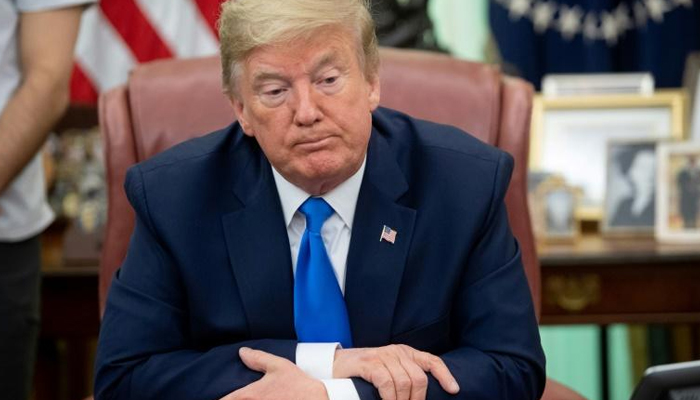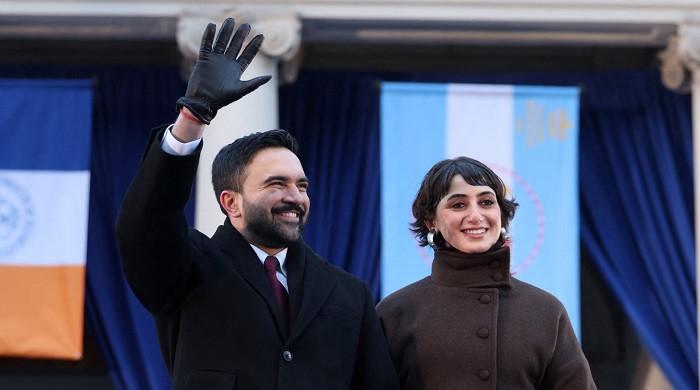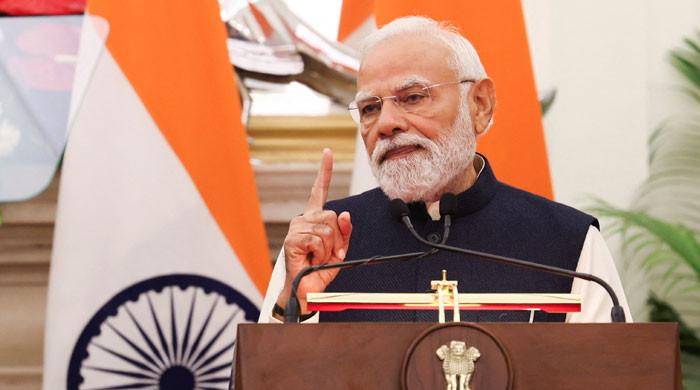US Supreme Court grills Trump's lawyer
Trump has sought to block enforcement of subpoenas by House of Representatives committees seeking his financial records
May 12, 2020

WASHINGTON: US Supreme Court justices on Tuesday posed tough questions to an attorney for Donald Trump and a Justice Department lawyer who sought to justify the president's bid to block Democratic-led congressional committees from getting access to his financial records in a major showdown over presidential powers.
The nine justices heard an oral argument by teleconference over attempts by House of Representatives committees to obtain the records in a pair of cases that test the authority of Congress to conduct oversight of the president.
Trump has sought to block enforcement of subpoenas by House of Representatives committees seeking his financial records from Mazars LLP, his long-time accounting firm, and two banks, Deutsche Bank and Capital One. A third case to be argued immediately after the first argument ends involved Trump's bid to block enforcement of a New York City prosecutor's subpoena for Trump financial records.
The justices queried Trump's lawyer, Patrick Strawbridge, about whether lawmakers can ever subpoena a president's financial records. Conservative Chief Justice John Roberts questioned Strawbridge on the broad scope of his arguments.
"Do you concede any power in the House to subpoena personal papers of the president?" Roberts asked.
Strawbridge said it was "difficult to imagine" a situation where that would be justified.
Roberts' questions of lawyers representing both Trump and the House signaled his view of the need to strike a balance between the powers of the president and Congress. On the one hand, he expressed skepticism that Congress had no authority to issue a subpoena or that a court could second guess its motivations to do so, while also doubting that congressional power was limitless.
"Should a court be probing the mental processes of legislators? Should members of House committees be subject to cross examination on why you were really seeking these documents?" Roberts asked Justice Department lawyer Jeffrey Wall.
Trump's lawyers have argued that the congressional panels had no authority to issue the subpoenas and had no valid legislative reason for seeking the records.
Roberts also seemed skeptical of arguments by a House lawyer that lawmakers have broad authority to investigate a president for the purpose of writing laws.
"Your test is not much of a test. It's not a limitation," Roberts told House counsel Doug Letter, adding that the House needed to take into account that it was dealing with another, co-equal branch of government.
Trump, unlike other recent presidents, has declined to release his tax returns and other financial records that could shed light on his net worth and the activities of his family real-estate company, the Trump Organization. The content of these records remains an enduring mystery of his presidency.
Liberal Justice Stephen Breyer probed whether under the approach taken by Trump's lawyers Congress would have been able to properly investigate the Watergate scandal of the 1970s under President Richard Nixon.
Liberal Justice Elena Kagan noted that where personal records are concerned "the president is just a man."
"What it seems to me you're asking us to do is to put a kind of 10-ton weight on the scales between the president and Congress, and essentially to make it impossible for Congress to perform oversight and to carry out its functions," Kagan told Strawbridge.
Conservative justices appeared to differ on whether the court had a role in probing the motives behind the subpoenas. Trump's lawyers have said the probes are intended to investigate the president for wrongdoing while the House said it was in pursuit of potential anti-corruption legislation.
Roberts and conservative Justice Neil Gorsuch, one of Trump's two Supreme Court appointees, appeared to be hesitant about second-guessing Congress, while Justice Clarence Thomas and Justice Samuel Alito seemed more skeptical about the Democrats' motives.
"Why should we not defer to the House's views on its own legislative purposes?" Gorsuch asked, suggesting skepticism about one of the president's arguments.
Wall said allowing the House subpoenas would lead to presidents being "harassed" about their personal lives.
"The potential to harass and undermine the president as president is plain," Wall told the justices. "It is not much to ask that before the House delves into the president's personal life it explains in some meaningful way what laws it is considering and why it needs the president's documents in particular. The subpoenas here don't even come close."
The third case, being argued immediately afterward, concerns a subpoena issued to Mazars for similar information, including tax returns, as part of a grand jury investigation into Trump being conducted by the office of Manhattan District Attorney Cyrus Vance, a Democrat.
Lower courts in Washington and New York ruled against Trump in all three cases.
Expansive view
Three months after Trump avoided removal from office in a Senate impeachment trial, Trump's lawyers want the Supreme Court to endorse their expansive view of presidential powers that would severely limit the ability of Congress to carry out oversight of presidents and of prosecutors to investigate them.
The Supreme Court has a 5-4 conservative majority. Trump has won key victories at the high court including over his hardline immigration policies but lost a big case a year ago regarding the US census when Roberts joined the court's four liberals.
Rulings are likely within weeks, with Trump seeking re-election on Nov. 3 amid the coronavirus pandemic. The teleconference format was adopted during the pandemic.
The House committees have said they are seeking the material as part of investigations into potential money laundering by banks and into whether Trump inflated and deflated certain assets on financial statements - as his former personal lawyer has said - in part to reduce his real estate taxes.
The New York criminal investigation was spurred by disclosures of hush-money payments by Trump to two women - pornographic film actress Stormy Daniels and former Playboy model Karen McDougal - who said they had past sexual relationships with him.
In the New York case, Trump's lawyers argued that his records cannot be handed over because of his authority as president under the Constitution, contending he is immune from any criminal proceeding while in office.









